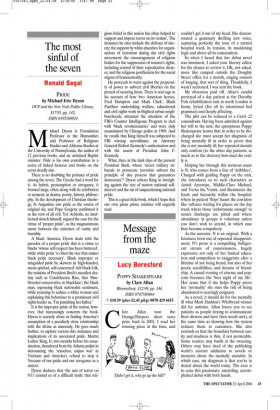Message from the maze
Lucy Beresford
POPPY SHAKESPEARE by Clare Allan Bloomsbury, £12.99, pp. 344, ISBN 0747580464 ✆ £10.39 (plus £2.45 p&p) 0870 429 6655 Clare Allan won the Orange/Harpers short story prize back in 2002. I read her winning piece at the time, and couldn’t get it out of my head. She demonstrated a genuinely thrilling new voice, capturing perfectly the tone of a mental hospital ward, its tension, its maddening logic and above all its camaraderie.
So when I heard that her debut novel was imminent, I asked your literary editor for the chance to review it. OK, not asked, more like camped outside the Doughty Street office for a month, singing sonnets of longing, that sort of thing. Thankfully, I wasn’t sectioned. I was sent the book.
My obsession paid off. Allan’s candid portrayal of a day patient at the Dorothy Fish rehabilitation unit in north London is funny, lyrical (for all its intentional bad grammar) and deeply affecting.
The plot can be reduced to a Catch 22 conundrum. Having been admitted against her will to the unit, the eponymous Poppy Shakespeare learns that in order to be discharged she must accept her diagnosis of being mentally ill in order to prove that she is not mentally ill; her repeated denials only confirm (to the other day patients, as much as to the doctors) how mad she really is.
Helping her through this tortuous maze is N, who comes from a line of ‘dribblers’. Charged with guiding Poppy on the unit, she introduces us to such characters as Astrid Arsewipe, Middle-Class Michael, and Verna the Vomit, and illuminates the feuds and hierarchy within the hospital: where in-patient ‘flops’ haunt the corridors like vultures waiting for places on the day ward, where those ‘unfortunate enough’ to secure discharge are pitied and where attendance in groups is voluntary unless you don’t wish to attend, in which case they become compulsory.
As the narrator, N is an original. With a feistiness born out of repeated disappointment, N’s prose is a compelling, belligerent stream of consciousness, hugely expressive not only of her limited education and compulsion to exaggerate after a lifetime of not being heard, but also of her poetic sensibilities, and dreams of friendship. A casual evening of cinema and popcorn becomes the ‘best night of my life’. Her sense that if she helps Poppy prove her ‘normality’ she runs the risk of being abandoned is searingly poignant.
As a novel, it should do for the mentally ill what Mark Haddon’s Whitbread winner did for autistics. Allan forces you to see patients as people (trying to communicate their distress and have their needs met), at the same time as showing how the system reduces them to caricature. She also reminds us that the boundary between sanity and madness is thin, if not permeable. Some readers may baulk at the swearing. Others may have tired of the publishing world’s current addiction to novels or memoirs about the mentally unstable. In which case, my diagnosis is that you’re in denial about the world today. The cure is to seize this passionate, unsettling, accomplished debut with both hands.


































































 Previous page
Previous page